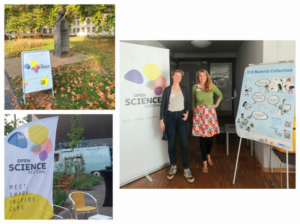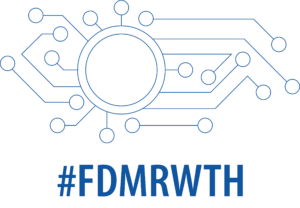Three data stewards from the technical training and consulting group N. Parks, K. Dukkart and C. Gonzalez of the Research Process and Data Management (RPDM) Department recently had the opportunity to attend the third annual Open Science Festival held at Johannes Gutenberg University Mainz, an event dedicated to exploring the principles and practices of Open Science.
As in the previous year, the festival brought together a diverse group of participants—from students and researchers to decision-makers and Research Data Management (RDM) professionals under the inspiring motto: “Meet, Share, Inspire, Care”.
What is Open Science?
The festival kicked off with discussions that sought to define both “science” and “open.” We learned that while not all scientific data is reproducible—especially in qualitative fields like clinical psychology—there are fundamental principles guiding openness. The mantra “as open as possible, as closed as necessary” resonated throughout the sessions, emphasizing the importance of data privacy and ethical considerations.
One key takeaway was understanding the difference between replicability and reproducibility. Replicability refers to whether other researchers can use the methods of an experiment to conduct their own experiments. It means they can repeat the same steps under similar conditions. The results do not have to be identical; it is about the methodology being traceable. Reproducibility, on the other hand, means that an experiment is conducted under the same conditions and yields the same results. Here, the focus is on the consistency of results when applying the same methods. This distinction is important for understanding scientific practices and contributes to discussions about transparency and openness in research.
Engaging Keynotes
A highlight was a keynote address by Johannes Vogel from the Museum für Naturkunde Berlin, who addressed the climate crisis through an Open Science lens. He challenged the audience to reflect on whether research itself is undergoing a deep transformation or facing stagnation, as outdated practices and closed approaches might lead to diminishing relevance in addressing urgent global issues.
- Source: Peter Pulkowski
- Source: Peter Pulkowski
- Source: Peter Pulkowski
- Source: Peter Pulkowski
- Source: Peter Pulkowski
- Source: Peter Pulkowski
Panel: Transparency and Intelligence? Advancing Artificial Intelligence with Open Science
A highlight of the festival was a panel discussion titled “Transparency and Intelligence? Advancing Artificial Intelligence with Open Science”. This session delved into how transparency plays a crucial role in integrating AI within academic practices.
Key Points:
- AI in Authorship: The panel emphasized the importance of being transparent about AI’s involvement in writing processes, particularly regarding citation standards.
- Principle of Explainability: A significant social question arose: Who needs to explain AI decisions? This highlights the necessity for accountability when utilizing AI technologies.
- AI as a Tool: While AI can assist researchers, it is not a panacea for all challenges faced in academia. It can facilitate certain tasks but cannot resolve deeper systemic issues alone.
- Open AI Models/Data: The discussion underscored the need for open access to AI models and datasets across various systems to foster collaboration and innovation.
- Transparency Limitations: One thought-provoking statement was that “transparency isn’t good in and of itself.” Just because something is transparent doesn’t mean it’s ethical or constructive.
- Understanding Training Sets: There is an urgent need to know what data informs AI training sets since this directly impacts outcomes and biases present in AI-generated content.
These discussions highlighted both the opportunities and challenges associated with integrating AI into research practices while advocating for greater transparency across methodologies.
Democratizing Science
The theme of democratizing science emerged strongly during discussions on moving from an “ivory tower” model of closed research to one characterized by accessibility and collaboration. Participants discussed how Open Science could enhance public engagement while combating distrust towards scientific institutions.
Open teaching practices were also discussed; for example, there’s currently little incentive for professors to share their lecture materials openly. This hinders collaborative learning opportunities among students.
Conclusion
Overall, attending the Open Science Festival was an enlightening experience, reinforcing the value of openness within research communities. By fostering collaboration across disciplines and promoting transparency in methodologies and findings, we can work towards creating a more inclusive scientific landscape.
Importantly, it became clear that researchers should be made aware from the very beginning of their careers about the necessity of sharing their data. Understanding this responsibility can foster a culture of collaboration right from the start and contribute significantly to scientific progress.
Moreover, having dedicated research data stewards is crucial for educating new scientists on Research Data Management processes and standards. These stewards can provide invaluable guidance on best practices for data sharing while ensuring compliance with ethical standards and legal requirements.
Reflecting on the discussions and insights from this vibrant gathering of minds committed to advancing Open Science principles highlights the potential for positive change—within academia and beyond. The conversation about openness in research must continue as the aim is a future where knowledge is accessible for all.
Responsible for the content of this article are Kseniia Dukkart, Catherine Gonzales and Nicole Parks.












Leave a Reply
You must be logged in to post a comment.